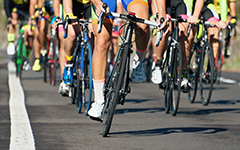UKAD issues Ready for the Games travel guide for athletes
With Major Games fast approaching, and athletes travelling overseas for events, some of us may be thinking about packing our suitcases and jetting off over the coming months (while following all the rules, of course!). For athletes, this can bring additional considerations with regards to medications and things to watch out for when travelling. UK Anti-Doping (UKAD) has put together a five-step guide to help you continue to train and compete clean when overseas, avoiding an accidental ban from sport.
1. Check all medications
If you need to purchase any medications while abroad, please make sure to check them carefully on Global DRO, even if it’s the same as what you’d normally take in the UK. Sometimes the ingredients within common medications contain different substances to those available in the UK, even if the branding and packaging appears the same. Athletes can search Global DRO for medications sold in Australia, Canada, Japan, New Zealand, Switzerland, the United Kingdom, and the United States. If you are purchasing medications in a country that does not operate a medication database like Global DRO you should contact your medical team or UKAD for guidance. Alternatively, you can search for the anti-doping status of each ingredient listed within the medication individually on Global DRO.
2. Take medications and supporting documents in hand luggage
If you are planning to travel abroad, where possible you should take enough medication to continue any treatment during the duration of the trip. However, you should first check whether you are permitted to possess the medication in the country you are travelling to as some countries have different custom laws. Any medications you need to take with you on holiday should be kept in your hand luggage, in case hold luggage is lost or delayed in reaching your destination. You are allowed to carry both essential medicines of more than 100ml, including liquid dietary foodstuffs and inhalers, and medical equipment, if it’s essential for your journey. You will need supporting documentation from a relevant medical professional (for example a letter from your doctor or a copy of your prescription).
3. Pack powdered supplements in hold luggage
UKAD always advises athletes take a food-first approach to nutrition. However, should you require supplements as part of your nutritional programme, it is best to pack them in your hold luggage. Advice on the gov.uk website states powders and food products can obstruct images on x-ray machines, meaning your bags may need to be checked again manually by security. So, to minimise delays, these items are best transported in hold luggage.
4. Beware of contaminated meats
In the past few years, it has been demonstrated that there may be a risk of ingesting prohibited substance clenbuterol through contaminated meats in certain countries, particularly China and Mexico. Meats most likely to be at risk include: Offal (including products such as pate), processed meat (salami, sausages etc), pork, beef, chicken and raw and uncooked meats.
Tips for athletes travelling to countries with known problems:
- Be aware of the risks posed
- Plan a nutrition strategy prior to travel. The English Institute of Sport (EIS) recommends; eating a wide variety of food to reduce the risk, if eating meat choose modest portions (e.g. avoid servings of more than 100g or 4oz), include one to two vegetarian protein-based meals a week, seek clarification of the supply of products.
- Seek reassurances from national/international federations (where possible) about reputable places to eat
- Try to eat organic meat that is traceable back to the source if meat consumption is necessary
We would also consider the following actions whilst travelling:
- Record where and when meat is eaten when residing in these locations
- Record the type and amount of meat eaten on each occasion
- Keep a record of all receipts
5. Track any emergency medications
Athletes may in the course of emergency treatment (e.g. surgery or an A&E admission) be provided with drugs or methods which are prohibited in sport. If you require emergency treatment or medication while abroad, please ensure that you obtain a copy of your drugs chart and all treatment records, prior to being discharged. It may be a good idea to take a card explaining you are an athlete and that you require this information, written in the native language of the country you are visiting, and have this on you at all times.
Download and print our 100% me clean sport pocket guide and take it with you when travelling this summer! If you are heading to the Tokyo 2020 Olympic and Paralympic Games this year, you will also receive it with your Squeaky, upon completion of your Clean Games education.




